We may not have the course you’re looking for. If you enquire or give us a call on + 1-866 272 8822 and speak to our training experts, we may still be able to help with your training requirements.
Training Outcomes Within Your Budget!
We ensure quality, budget-alignment, and timely delivery by our expert instructors.
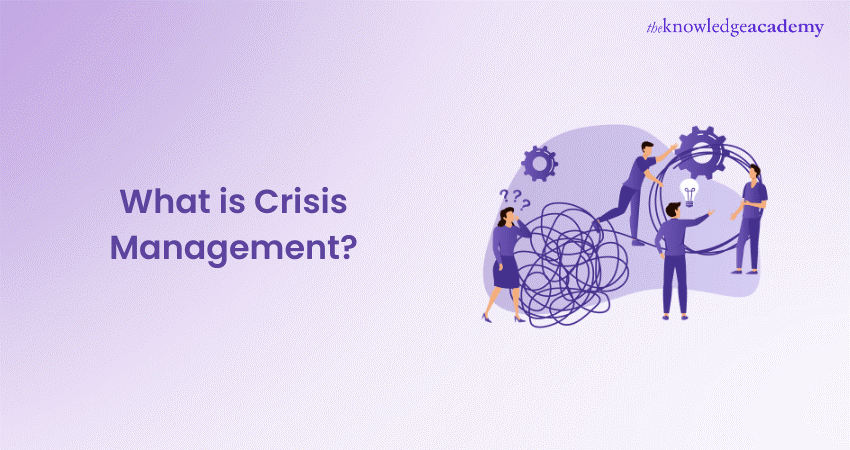
Crisis Management is a strategic approach for organisations to identify and respond to critical events, such as unexpected threats that may impact people, property, or operations. A solid plan helps mitigate secondary effects, including damage to brand reputation and employee morale.
By prioritising Crisis Management, organisations can shift from reactive to proactive measures, ensuring safety and continuity while protecting assets. This involves forming a dedicated team for management of crisis and regularly testing the plan, supported by technologies like critical event management platforms.
This blog explores types of crises, building a Crisis Management team, essential elements of a management plan for crisis, key evaluation questions, and effective testing methods.
Table of Contents
1) What is Crisis Management?
2) Importance of Crisis Management
3) Different Types of Crises
4) Causes of Crises
5) The Five Stages of Crisis Management
6) Goals of Crisis Management
7) How to Develop a Crisis Management Plan?
8) Steps for Implementing Crisis Management
9) Common Challenges in Crisis Management
10) Conclusion
What is Crisis Management?
Crisis Management involves preparing for, responding to, and recovering from unexpected and disruptive events that threaten an organisation’s stability, reputation, or existence. It encompasses a series of strategic actions designed to mitigate the negative impact of a crisis, ensuring that organisations can adapt and continue functioning. A well-crafted Crisis Management plan empowers organisations to respond swiftly and effectively, transforming potential chaos into manageable challenges.
Importance of Crisis Management
The importance of Crisis Management cannot be overlooked. It equips organisations with the ability to deal with adverse situations efficiently so that the risk of big repercussions is rather low. The best practices of Crisis Management ensure:
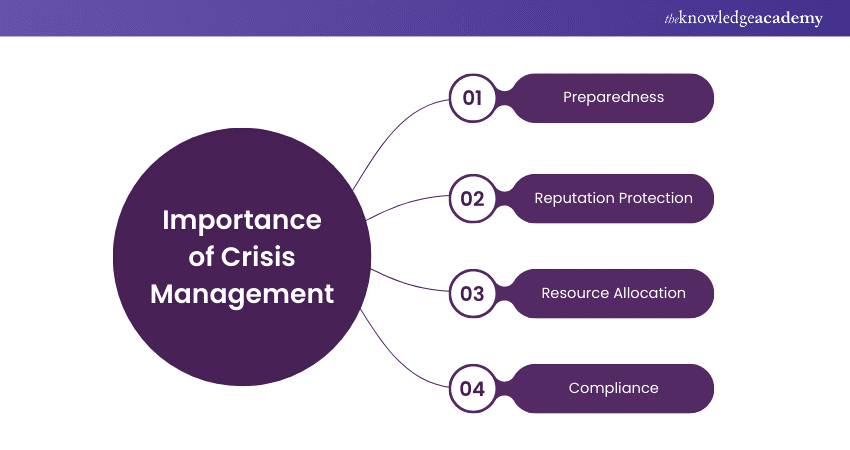
1) Preparedness: Organisations better prepared with a crisis plan are more resilient and adaptable, hence better equipped in times of adversity.
2) Reputation Protection: A rapid and appropriate response can save an organisation's image and stakeholder trust.
3) Resource Allocation: In addition, proper management will guarantee the resources are allocated to places they are needed most during a crisis.
4) Compliance: In many industries, there are regulatory and compliance-mandated Crisis Management processes. There are numerous advantages of focusing on Crisis Management for any organisation.
By prioritising Crisis Management, organisations will find themselves better prepared to come out even stronger.
Different Types of Crises
Crises could be different by type, and each will pose different challenges to the organisation. Understanding the type of crisis that occurs may be of importance in helping develop specific response mechanisms.
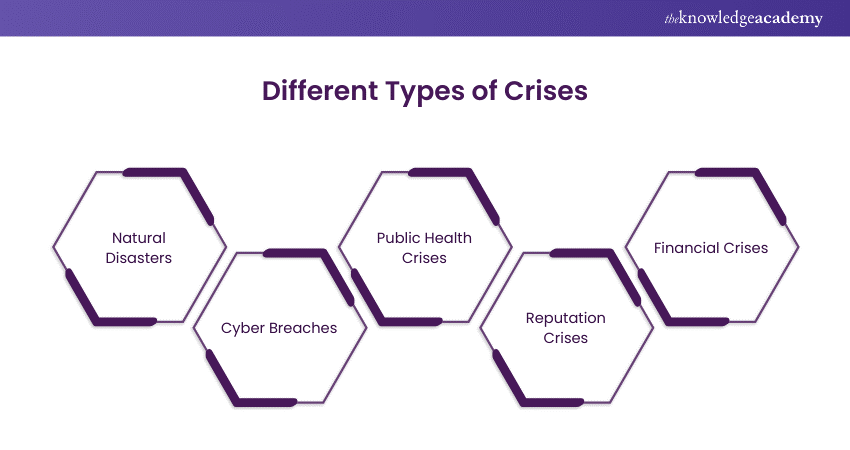
1) Natural Disasters
Hurricanes, floods, and earthquakes are some of the natural disasters. In these events, the entire community will be affected, meaning that there will be disruptions in many places. Businesses will need preparation regarding its safety, including its employees, and continuity in services.
2) Cyber Breaches
Organisations facing an increasingly digital world will face the challenge of cybersecurity breaches. Data breaches, ransomware attacks, and identity thefts cause critical financial and reputational damage. Quick detection, fast containment, and speedy recovery happen in effective Crisis Management for this area.
3) Public Health Crises
Pandemics and health emergencies, as had been seen by the unfolding of the COVID-19 breakout, demand all-inclusive Crisis Management exercises. Companies will need to care for health and safety while striving for the fluid adjustment measures for fast-changing guidelines and shifts in public opinion.
4) Reputation Crises
Reputation crises arise due to numerous reasons like, unethical practices, public relations disasters or negative publicity. The management of such crises is a part of effective communication in addition to ensuring the system in place to regain the trust of the stakeholders.
5) Financial Crises
These are crises in the finances of an organisation and are majorly caused due to economic downturn, fraudulence or mismanagement. The very effectiveness of an organisation can be called into question due to financial crises. A good Crisis Management procedure thus not only comprises risk analysis but also corrective measures toward regaining financial health.
Causes of Crises
Understanding why there is a crisis is important to management. There are mainly two types of crises that an organisation may face:
1) Surprise Crisis
Surprise crises happen without warning; therefore, little time is available for preparations before the onslaught of the crisis. Natural disasters or overnight financial collapses are some examples. Under such circumstances, organisations have no choice but to perform spontaneous operations based on pre-arranged steps.
2) Smouldering Crisis
The latent type of crisis is slow developing, and thus it may leave with the organisation for a good and indefinite period before its outbreak. Issues such as dissatisfactions of employees and perhaps failures in terms of regulatory compliance can be smouldering in the organisation just to lead to bigger problems afterwards in case nothing is done about it. Proactive monitoring and intervention are crucial in managing such crises.
Master Crisis Management techniques that safeguard your organisation from unexpected challenges. Join our Crisis Management Training now.
The Five Stages of Crisis Management
Crisis Management comprises five core stages that will guide organisations through the process effectively in handling crises.
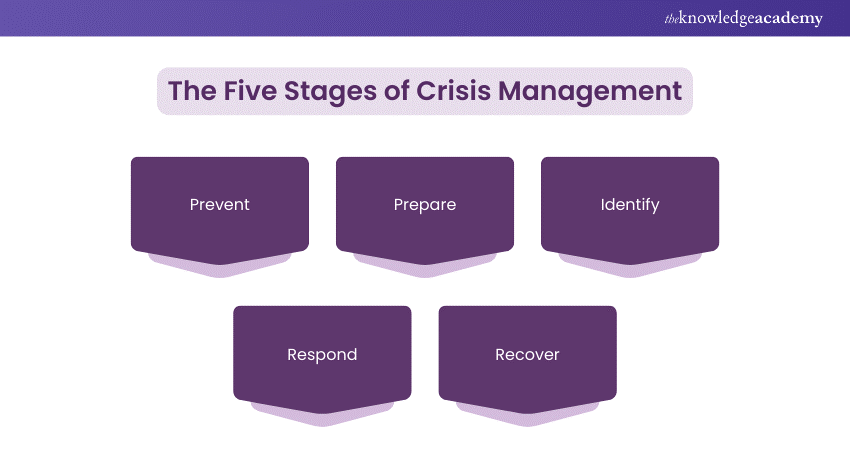
1) Prevent: Identify potential hazards and implement measures to prevent crises from occurring, ensuring proactive risk management.
2) Prepare: Establish a Crisis Management plan which requires communication, team roles, and rules for taking response action.
3) Identify: Quickly recognise when a critical event is unfolding. Activate the Crisis Management plan to mobilise resources and response efforts.
4) Respond: Implement the Crisis Management plan with immediate effective action to contain the situation.
5) Recover: Assess the impact and commence recovery operations back to normal service provision.
Goals of Crisis Management
The primary objectives of Crisis Management relate to maintaining stability as well as protecting stakeholders. Amongst the key objectives are as follows:
1) Ensuring Safety and Well-being
First and foremost, there is a need to safeguard both employees, customers, and the community. The organisation needs to do everything to prevent further harm and reduce the risk associated with people and assets.
2) Minimising Operational Disruptions
Effective Crisis Management would try to be interrupted and, therefore, possible operations should be delivered as minimally impacted by the effects of the crisis.
3) Delivering Crisis Communication
To survive a crisis, it is very important that organisations communicate effectively and on time and in this crisis, it has become necessary that an organisation delivers the right information for its stakeholders to gain their trusts instead of increasing doubts.
4) Protecting Reputation and Brand Image
A strong response to a crisis can help safeguard an organisation’s reputation. Organisations need to work proactively in managing public perception and to interact with other stakeholders in rebuilding trust.
5) Learning and Adapting
Improvement requires post-crisis evaluation. Organisations need to evaluate the procedures they implemented and gain lessons to avoid future mistakes in Crisis Management.
How to Develop a Crisis Management Plan?
Developing a proper Crisis Management plan involves several major steps:
1) Identify Potentials Risks: Thoroughly analyse the potential crisis relevant to your organisation.
2) Establish a Crisis Management Team: All those possible communication, operations, and legal representatives must be determined in advance for handling the crisis.
3) Develop Communication Strategies: Describe how information would be disseminated and shared with various stakeholders involved in a crisis event, including social and traditional media.
4) Conduct Training and Drills: Train all employees who might need to respond when the crisis comes along by organising mock exercise and drills.
5) Review and Update the Plan: Periodically review the Crisis Management plan to bring in new risks arising, and lessons learned from previous crises.
Steps for Implementing Crisis Management
Once a crisis arises, following a structured approach can help mitigate its impact:
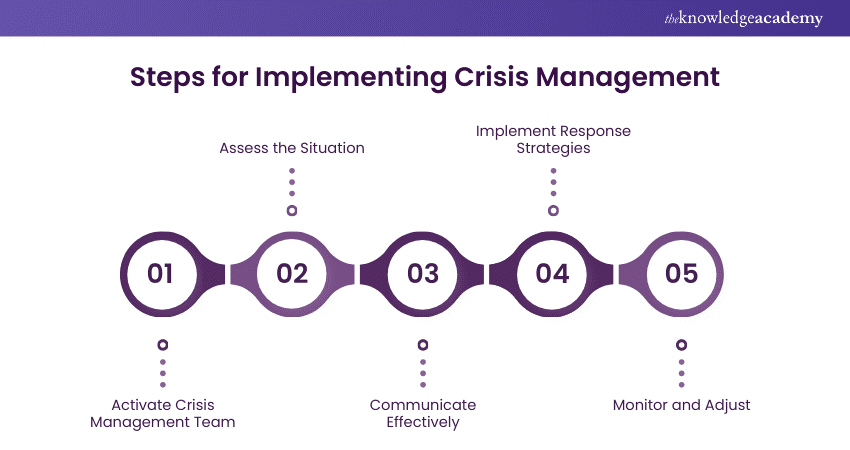
1) Activate Crisis Management Team: Work together the selected team to study the situation and action that must be taken necessary.
2) Assess the Situation: Gather all possible information to assess the crisis, scope, and implications.
3) Communicate Effectively: Communicates effectively with stakeholders for timely information on what's happening, ensuring clarity and transparency.
4) Implement Response Strategies: This step implements the Crisis Management plan developed and executes the strategies set as an immediate response to the crisis.
5) Monitor and Adjust: Monitor the situation continuously, adjusting strategies as necessary to accommodate changing circumstances.
Common Challenges in Crisis Management
While effective Crisis Management is crucial, organisations often face challenges, including:
1) Communication Breakdown: Bad communication can exacerbate matters in a crisis, and clear, concise messaging is absolutely required.
2) Resource Limitations: Organisations may not have enough resources and people for a crisis, which dampens the effectiveness of the response efforts.
3) Public Perception: Crisis Management is a tricky issue; it involves an attempt to handle the public image through proper communication and interaction.
4) Lack of Preparedness: Overestimation of the fact that adequate Crisis Management planning is not a requirement, result in confusion at the time of actual crises.
Discover the secrets of effective management! Join our Introduction to Management Course and become a leader in your field.
Conclusion
Management from crisis empowers organisations to navigate unexpected challenges with resilience and agility. By understanding the types of crises, developing comprehensive plans, and focusing on effective communication, organisations can protect their reputation, ensure stakeholder safety, and emerge stronger from adversity. Embracing a proactive approach to Crisis Management not only prepares organisations for the unexpected but also cultivates a culture of resilience that can weather any storm.
Transform Your Team Dynamics! Register for our Introduction to Managing People Course now to master effective management strategies.
Frequently Asked Questions

Managing a personal crisis involves acknowledging your feelings, seeking support from friends or professionals, and creating a plan. Prioritise self-care by engaging in activities that bring you peace. Focus on small, manageable steps to regain control, and remember that it’s okay to ask for help when needed.

The four pillars of Crisis Management include preparedness, response, recovery, and mitigation. Preparedness involves planning and training; response is the immediate action taken during a crisis; recovery focuses on restoring normalcy, and mitigation aims to reduce the impact of future crises through risk management strategies.

The Knowledge Academy takes global learning to new heights, offering over 30,000 online courses across 490+ locations in 220 countries. This expansive reach ensures accessibility and convenience for learners worldwide.
Alongside our diverse Online Course Catalogue, encompassing 19 major categories, we go the extra mile by providing a plethora of free educational Online Resources like News updates, Blogs, videos, webinars, and interview questions. Tailoring learning experiences further, professionals can maximise value with customisable Course Bundles of TKA.

The Knowledge Academy’s Knowledge Pass, a prepaid voucher, adds another layer of flexibility, allowing course bookings over a 12-month period. Join us on a journey where education knows no bounds.

The Knowledge Academy offers various Management Courses, including the Management Training for New Managers Course, and the Introduction to Management Course. These courses cater to different skill levels, providing comprehensive insights into What is Category Management.
Our Business Skills Blogs cover a range of topics related to Management, offering valuable resources, best practices, and industry insights. Whether you are a beginner or looking to advance your Management skills, The Knowledge Academy's diverse courses and informative blogs have got you covered.
Upcoming Accounting and Finance Resources Batches & Dates
Date
 Crisis Management Training
Crisis Management Training
Fri 17th Jan 2025
Fri 21st Feb 2025
Fri 4th Apr 2025
Fri 6th Jun 2025
Fri 25th Jul 2025
Fri 7th Nov 2025
Fri 26th Dec 2025







 Top Rated Course
Top Rated Course



 If you wish to make any changes to your course, please
If you wish to make any changes to your course, please


